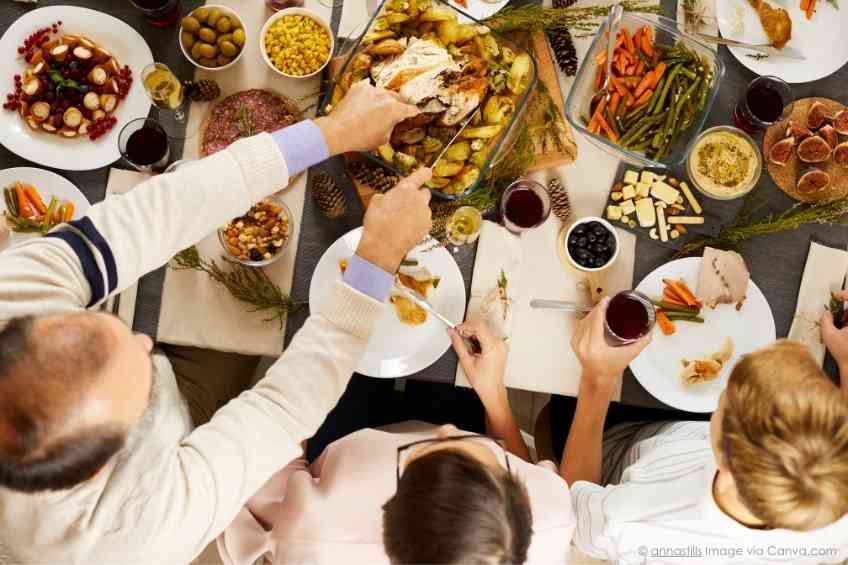The holiday season comes with a lot of everything—but especially food. All this meal-inspired merriment not only brings lots of calories with it, but the endless flood of dishes, desserts and snacks also serve up an unhealthy portion of guilt over fears that diets have been busted and unwanted pounds added. It is all a deflating social and gastronomical combination for many. Fortunately, there may be a happy medium when it comes to holiday eating that doesn’t involve denial, guilt and gluttony, at least according to Dr. Whitney Linsenmeyer, a nutrition specialist. She recently served up a menu of healthy eating approaches designed to lighten the calorie and guilt load for everyone proving healthy holiday eating is possible and enjoyable.
Is it hard to eat well during the holidays?
It can certainly feel like a challenge. Especially if we think about the holidays as starting at Thanksgiving and continuing through the new year, we’re looking at six weeks or more of different types of parties and family gatherings where there are just different foods than we’re used to oftentimes more indulgent and celebratory foods. So, people can feel overwhelmed just given the amount of opportunities that they have, while they are thinking about following these healthy goals year-round. It can feel more challenging just because of this season which happens to be pretty food-centric.
Is it more challenging or has it always just been challenging?
It seems like people are starting to be much more aware of and conscious that people might be following different types of diets. We hear more and more people who are following a gluten-free diet or a vegetarian diet or we’re conscious of different allergens that people might need to be sensitive to. We’re in an era of recognizing that people are eating in different ways. And respecting that is the general trend in society that I’m seeing. In general, I think that’s a good thing. We’re just respecting people where they’re coming from, their dietary needs and if it’s within our control, like if we’re the ones hosting the party, we’re making attempts to have something that they can enjoy at the holiday gatherings.
Is it more challenging because the holidays are such an extended period too that it’s almost inescapable to get away from the flood of food and wine?
Yes, our holiday season is long. About six weeks, depending on what you celebrate. We talk about our food environment. And this applies to us year-round, not just at the holidays. But it’s all the food that we’re surrounded by in our homes, in our places of work, in our neighborhoods and what restaurants or grocery store options are there. And in general, we know that a lot of people live in what we consider to be poor food environments. Where there are very few options for healthy, nutritious and fresh foods. If we take that same way of thinking, especially during the holidays, the food environment, because it’s punctuated by so many different celebratory events that often center around food, our food environment might look pretty different compared to the rest of the year.
Why do you think we associate the holidays with heavy eating? Is it a reflection of the past that is just carried on?
Decades or centuries ago, we would save these delicacies for the holidays, things that we didn’t have year-round and then we would have them, maybe one or two times per year during the holidays. These are more rich and indulgent foods higher in calories and we tend to feel guilty about that and about appreciating those foods. I think it’s time to give ourselves some grace, to step back and release ourselves from those feelings of guilt and appreciate the amazing symbolism that specific foods have in our family traditions, our culture and our religions.
So how do we prepare for knowing that the holidays and all the food is coming?
We can do a mental reframe. We know that we’re probably faced with the option of less nutritious foods. Given this, there are things people should think about as they approach the holidays. Not necessarily guilt, but different strategies or mindsets in different settings. So, if you’re going to a holiday party versus hosting in your home versus going to a restaurant setting. And different strategies that can work in each of those different types of places.
When going to a holiday party at somebody’s home, one strategy can be to bring a healthy dish to share. I know a lot of times we’re thinking, it’s only going to be heavy foods, sweets and lots of indulgent things. But if you can be the one to bring a healthy dish, chances are other people also want to eat something healthy and don’t just want to eat holiday cookies for dinner. And then also, if I’m at somebody’s home and there’s a huge buffet of foods and they’re really heavy options, to kind of pretend like you’re one of those expert taste testers like we see on Iron Chef or different TV shows, where they taste everything. They’re not shy about it, but they don’t eat a whole portion. They just take a few bites and they enjoy it. And then they move on to the next thing. We can channel their energy and pretend like we are those expert taste testers. My third strategy is if you’re going to somebody’s home and you feel like there’s more food here than I can even taste and there’s going to be tons of leftovers—I always think it’s a nice gesture to ask if you can take something to go. I think this makes the person who brought the dish feel really good that you want to enjoy their food later. And it takes the pressure off of you having to eat all of the different foods in one sitting.
What about the dangers of family holiday meals? Is grandma or mom just piling food on your plate still a factor?
One of the first patients I ever worked with, when I started doing nutrition counseling, came in feeling stressed out knowing that her in-laws were going to put a lot of pressure on her to pile food on her plate and to clean her plate. She was crying. She was upset because she was also trying to follow these personal healthy eating goals. And she felt like it was this sort of pressure cooker around the holidays. So how do you combat that? I think that is still very much a reality for people. Ask to take the food to go. Say this is so good. I just can’t finish it. Take that piece of pumpkin pie home for the next day. And then depending on your family, maybe you can also be very honest and say, hey, I’m trying not to overeat tonight and I’m feeling pretty full. I’m going to pass.
What are some of the mistakes people make when they overeat around the holidays? Are there misplaced exercise or eating strategies they should avoid?
I tend to see people restrict their eating all day or even the days prior because they’re just expecting that they’re going to overeat at that holiday party. So, this idea of like, I’m going to restrict and then compensate for it by not eating and then go wild at the party. It’s just a recipe for getting overly hungry and then eating until you’re uncomfortably full, almost like binge eating. And it doesn’t feel good. So instead, practice having smaller and sensible meals throughout the day so that you’re not ravenous going in because your body is going to tell you and want you to overeat if you are at that very high hunger level.
What about the role exercise may play in this? Are people trying to exercise their way out of these issues?
That can happen too. I don’t think that’s necessarily a terrible thing. If we’re thinking bigger picture about our balance between exercise and our eating, if people get really into the strict mindset of like, I’m going to have this piece of pie and then walk on the treadmill for this many minutes, that’s the kind of thinking that we want to avoid. Metabolism is more complex than that simple math. But I do love the idea of integrating physical activity into a party, especially if you’re the one who’s hosting. So that gets me into my thoughts about how they are when it’s in your home. And one of those strategies is to have some kind of physical activity built in. So maybe it’s a dance party or just a walk in the neighborhood or a game of football. Even if it’s playing a game of charades that gets people off the couch and moving their bodies a little bit.
What’s a responsible way to approach hosting a holiday meal? Somebody could serve all salad, but I wouldn’t want that at Thanksgiving.
Two strategies come to mind when you’re hosting in your own home. So, the physical activity, yes, but also having Tupperware ready to send home with people sort of as their party favor. I think when people know that those are there on the counter it immediately takes that pressure off of having to eat several versions of the same food. I don’t have to try them all. It sends a message to your guests that they can take a little bit and save it for later.
My other strategy for when it’s in your home is to have a separate dish that is inconspicuously healthy, meaning it features some of those more nutrient-dense food groups like vegetables, beans or legumes as the stars. My family started making roasted acorn squash that was stuffed with wild rice at Thanksgiving. People love it. It’s not overtly healthy, but people really enjoy it and it’s a little bit more dazzling than the turkey, frankly.
Where is alcohol’s role or influence on all of this during the holidays?
I think just with food, this is an area where people tend to maybe overdo it. Maybe it’s not just the food that’s the issue, but for many people, it’s the alcohol. It’s easy at a party to be drinking socially and drink more than you normally would or have a mixed drink and you’re not quite sure how many calories are present in there. So, keep in mind the recommendation is no more than one drink per hour and to stay hydrated in between those drinks so that you give your liver time to metabolize the alcohol and pace yourself throughout the night.
Is making a New Year’s resolution to lose weight a productive follow-up to the holidays?
I think, especially when we’re talking about alcohol, people do like to participate in Dry January, which can for some people lead to a shift in the mindset in December of I can overdo it a little bit because I know I’m going to make up for it in January. In general, there’s nothing wrong with setting resolutions. There’s nothing wrong with wanting to improve your diet and having goals for yourself. I think all that is fine and well. Where it gets to be unhealthy is when it goes through drastic swings in your eating patterns. We want to avoid that cycle of dieting or weight cycling when we see a person’s body weight fluctuate up and down. That is harmful to our physical health, our metabolism, our mental health and our relationship with food.
How would you then approach the post-holiday season? Is there something you’d recommend people do after the holidays?
I’ve seen this idea of setting a resolution where people are setting those goals going into the holiday season so that they’re not having those swings back and forth from December to January. I’m not on social media, but my students are, and they tell me that this is all the rage right now to set those lifestyle goals for yourself in the fall time so that you’re going into the season taking care of your health at the offset.
The cold weather during these winter months is another challenge. There is a perceived danger that we tend to become more sedentary after the holidays. Is that accurate?
Yes. And usually, people aren’t thinking about physical activity goals in the wintertime. That’s what usually people would think of in the spring and summertime. So, in general, people tend to be less active during those winter months because of the change in the weather. And I think also, some people that might be prone to going to a gym, if that’s how they like to work out, have a heightened awareness of the cold and flu bugs and COVID that could be passed in those settings. Frankly, it’s one of the times that I avoid the gym, not because I don’t want to be outside, but because I don’t want to pick up the cold bugs from the person next to me.
What do you think is the biggest misconception people have about holiday eating?
A big misconception is that in order to eat well during the holidays, you need to change your recipes to make them healthier, like cutting out fat, sodium or sugar. Oftentimes people equate, I’m going to eat healthy with, I’m going to take this recipe and I’m going to rewire it and do it totally different. I think a different approach and sometimes a much more sensible approach is to make foods in their traditional way and to have smaller portions of them. It’s not easy to do. I think discipline or moderation can be extremely difficult for people. But the mindset of like, okay, I’m going to make these mashed potatoes that have no butter, no fat, no salt in them and then eat a lot of them. That is not as good an approach as I’m going to make these mashed potatoes, they’re going to be rich, they’re going to have butter, they’re going to be nice and salty and it’s going to be awesome. It’s just a different way of thinking. And I think people can really feel a little bit liberated when they don’t have to change their traditional recipes, they just have to think about how much they are eating for a serving.
What would you want people to walk away from after hearing this?
Number one is to release yourself from any guilt and instead appreciate the amazing symbolism that foods have in our family traditions, cultures and religions. And then thinking through those different scenarios that you’re going to be in this holiday season. If you’re going to a holiday party, you can bring a healthy dish to share. Pretend like you’re a professional taste tester or ask if you can take something to go. If you’re hosting in your home, you can have a show supper dish that is inconspicuously healthy. Have Tupperware ready to send home and build in some physical activity.
 About Whitney Linsenmeyer, PhD, RD, LD
About Whitney Linsenmeyer, PhD, RD, LD
Whitney Linsenmeyer, PhD, RD, LD, is an assistant professor of nutrition and dietetics at Saint Louis University. Her research and clinical practice centers on gender-affirming nutrition care for the transgender community. She is a graduate of Saint Louis University where she earned a master’s degree in nutrition and culinary entrepreneurship and a doctorate in higher education administration. Linsenmeyer is also a member of the Academy of Nutrition & Dietetics.
Please visit eatrightpro.org to learn more.










